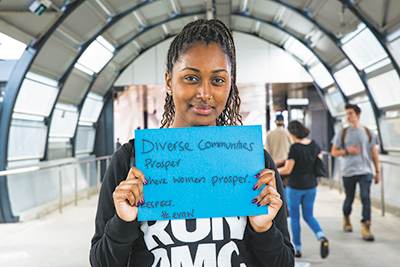Momentum around the prevention of violence against women has been building over the last year and local governments are showing their support.
February 12 marked two years since the passing of eleven-year-old Luke Batty at the hands of his own father. The event proved a tragic catalyst, since then, the tireless efforts of his mother, Rosie Batty, have helped spark a conversation about family violence on a national scale.
The statistics are still dire. Almost every week an Australian woman is killed by a current or former partner and it is estimated violence against women and their children costs the Australian economy more than $13.6 billion per year.
In November, a national framework for addressing family violence ‘Change the Story’ was launched by Our Watch, VicHealth and ANROWS (Australia’s National Research Organisation for Women’s Safety), aiming to act as a guide for organisations at all levels to help in the primary prevention of violence.
The strategy – delivered as part of a broader federal government plan – is thought to be a world-first, according to Our Watch, no other country has a detailed, coordinated plan to tackle the problem on a national level in this way.
Under the framework, local government has shifted from being considered simply a ‘setting’ in which domestic violence can occur, to being recognised as a third tier of government – signalling the increased recognition of the role the sector can play.
In Victoria, local government has been active on the issue over the last decade.
In 2010, the Preventing Violence Against Women (PVAW) Network was established by the Municipal Association of Victoria (MAV), in partnership with the City of Darebin and VicHealth.
PVAW Policy Adviser at the MAV, Kellie Nagle, said the network – which holds quarterly meetings and collates a digital newsletter – provides a valuable space for councils to share ideas and discuss challenges. All 79 Victorian councils have a representative that communicates with the network in some capacity.
Nagle said the meetings allow “the opportunity to connect with what other people are doing. Someone might be doing something in HR, or someone else in infrastructure. It’s allows for a cross-pollination of ideas”.
According to survey results from the network, local government engagement with PVAW issues has spiked significantly over the last 12 months.
In December, a forum was held by the MAV in conjunction with Our Watch, which showcased work across the sector in areas as varied as gender equitable design, preventing violence in emergencies and telling stories through hip-hop.
Nagle said the forum offered a moment to reflect on the increased acknowledgement of the issue over the past year and “take stock and celebrate what councils have achieved in contributing to that momentum”.
At the forum, Maribyrnong City Council presented on their program ‘She’s Game’, which aims to challenge attitudes and increase female participation at local sporting clubs.
Maribyrnong has been an early adopter of action on prevention of violence against women. In 2008, in partnership with VicHealth, the council developed the ‘Preventing Violence Against Women Guide for Local Government’, which included a focus on how to change a council’s own internal culture and normalising discussions on gender equity.
Maribyrnong is rare in the fact it employs a full-time, council-funded Gender Equity Coordinator, Emma Wilkinson, who is responsible for overseeing a range of PVAW initiatives.
Wilkinson said Maribyrnong and local government in general is most active in the primary prevention area, which means working on “challenging unequal power distribution and rigid gender stereotypes”. Programs like She’s Game, which help to increase respect for women, in turn help eliminate the drivers of violence.
Wilkinson agreed that interest from local government is on the rise – in her role she fields regular calls from councils across the country asking advice, calls which she said have increased significantly over the past year.
Elsewhere across the country, the Local Government Association of Queensland (LGAQ) recently showed support through its ‘Safer Families, Better Communities’ campaign, which culminated in a council-led, statewide day of action.
In September, the deaths of two women and a child in alleged domestic violence incidents prompted a surge of community anger across Queensland, and LGAQ decided it was time for councils to publicly declare unity against domestic violence.
More than 40 councils held events, many coordinating rallies on 11 October, and urged residents to pledge against violence. A social media campaign reached hundreds of thousands of people online.
A spokesperson for LGAQ said the campaign is reflective of the frontline leadership role local government can play.
“Local councils, as the closest form of government to the community, are acutely aware of the scourge of domestic violence. Many address the issue through ongoing support of groups set up to address domestic violence.
The strong commitment by the Federal and State governments to reducing domestic violence is enormously helpful, but the issue also needs to be addressed at the community level.”
–
If you or someone you know is impacted by domestic or family violence or sexual assault, call 1800RESPECT on 1800 737 732 or visit www.1800RESPECT.org.au. In an emergency, call 000.

















